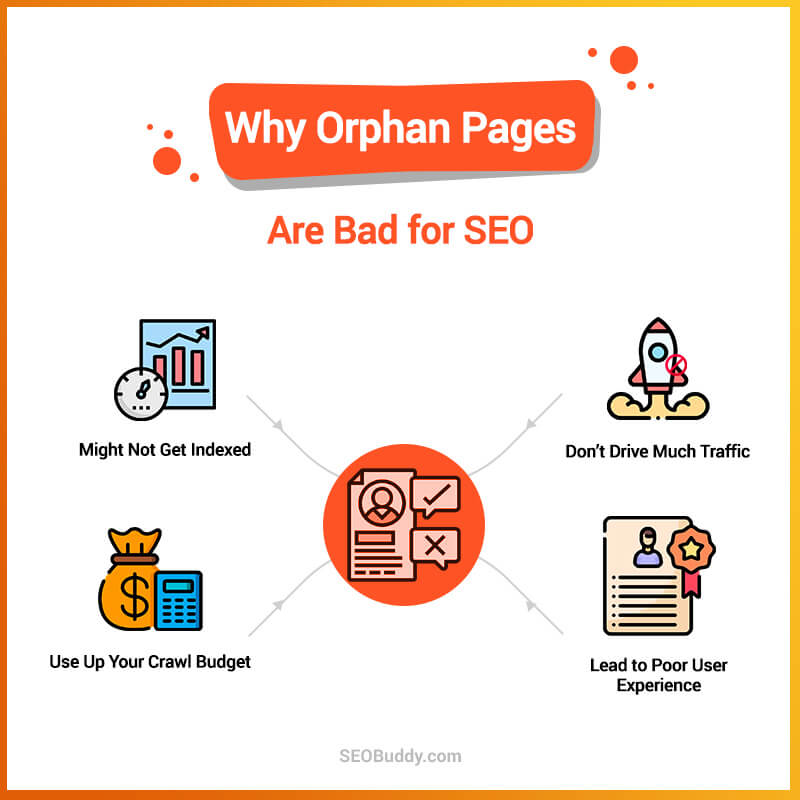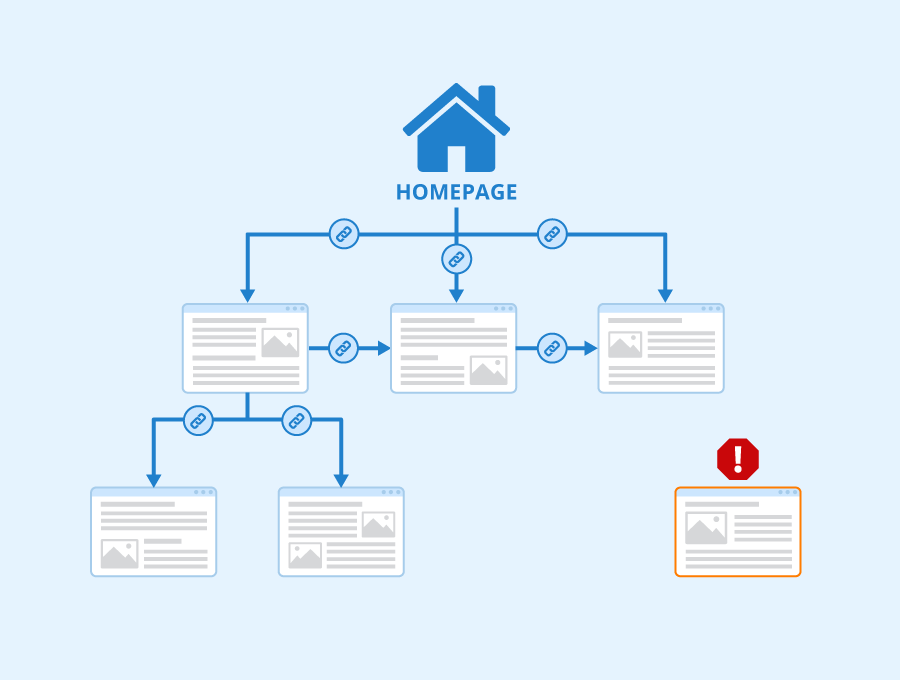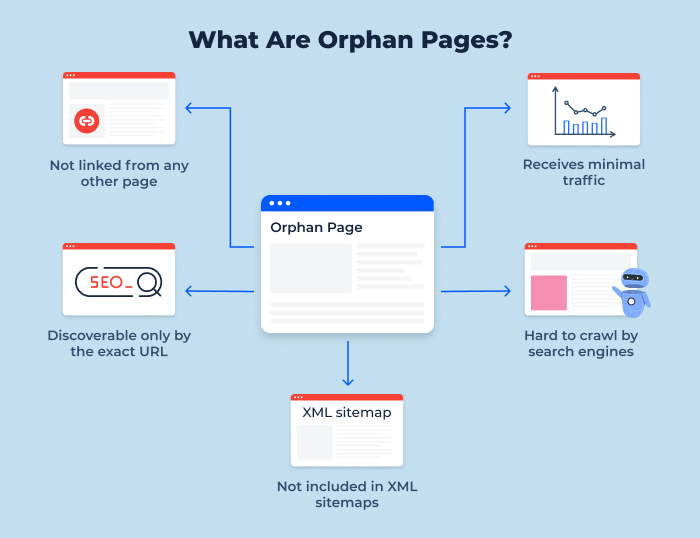Are your orphan pages hurting your SEO rankings? Learn how to identify and fix them with these expert tips today!

Image courtesy of via DALL-E 3
Table of Contents
Introduction: What Are Orphan Pages?
In the vast world of the internet, there are special kinds of web pages that go unnoticed, like lost puppies in a crowded park. These lonely pages are known as orphan pages, and they play a crucial role in the world of SEO (Search Engine Optimization). Let’s dive into what orphan pages are and why they matter.
What is an Orphan Page?
Imagine you have a favorite book that no one else knows about because it’s not listed in any library catalog. That book is like an orphan page—a web page that exists on a website but isn’t linked to from any other page. Just like that hidden book, orphan pages are hard to find because they don’t have connections to guide visitors or search engines.
Why Are They Called Orphan Pages?
The term “orphan” itself conjures images of being alone with no family. Similarly, orphan pages are called so because they are isolated and disconnected from the rest of the website. In the world of websites, connections are key. Without links from other pages, these orphan pages are left adrift in cyberspace, unseen and forgotten.
Why Orphan Pages Are a Problem
Orphan pages can cause significant issues for websites, especially when it comes to SEO and visibility. Let’s dive into why these pages are problematic and why it is essential to address them.
Hard for Search Engines to Find
Imagine you have a favorite book that no one knows about because it’s not listed in any library catalog. Orphan pages are like those hidden books—search engines like Google have a tough time finding them because they are not connected to the rest of the website. This means that fewer people will come across these pages when searching online.
Missed Opportunities
When websites have orphan pages, they miss out on many opportunities. Fewer visitors mean less engagement with the content on those pages. This can lead to potential revenue loss for businesses that rely on website traffic. By not making these pages easily accessible, valuable information or products may go unnoticed by potential customers.
Identifying Orphan Pages
Website crawlers are like detectives that search through every nook and cranny of a website to find hidden pages. They work tirelessly to discover pages that are not linked to any other pages on the site. Tools like Screaming Frog can be your trusty sidekick in this mission. They scan your website and reveal any orphan pages lurking in the shadows.

Image courtesy of www.sitecentre.com.au via Google Images
Manual Checks
If you prefer a hands-on approach, you can put on your detective hat and manually inspect your website for orphan pages. Start by examining the structure and navigation of your site. Look for pages that seem isolated or disconnected from the rest of the content. These lonely pages could be the elusive orphan pages you’re hunting for.
Fixing Orphan Pages
Orphan pages can be a headache for website owners, but don’t worry! There are ways to fix them and improve your site’s SEO. Let’s dive into some strategies to help these lonely pages find their place on your website.
Link From High-Traffic Pages
One way to fix orphan pages is by linking them from popular pages on your website. When you create internal links from high-traffic pages to orphan pages, you’re helping search engines discover and index these hidden gems. Think of it like adding signposts to guide visitors to a hidden treasure!
Add to Navigation Menu
Another way to fix orphan pages is by adding them to your website’s main navigation menu. By including these pages in your site’s menu, you’re making them more visible and accessible to both users and search engines. This simple step can improve the overall user experience and boost the chances of these pages getting noticed.
Best Practices for Avoiding Orphan Pages
Regular site audits are crucial to preventing orphan pages on your website. Just like how you tidy up your room to find lost toys, auditing your site helps you locate any pages that are not properly linked. By checking your website regularly, you can catch orphan pages early before they cause any problems.

Image courtesy of www.seobility.net via Google Images
Consistent Linking Strategy
Having a consistent linking strategy from the beginning is key to avoiding orphan pages. Imagine each link on your website is like a bridge connecting different places. If you build these bridges carefully from the start, you won’t end up with any isolated areas that are hard to reach. Make sure that every page on your website is connected to others, creating a web of links that search engines can easily navigate.
Tools and Resources
When it comes to managing and fixing orphan pages on your website, the right tools can make all the difference. Here are some handy resources that can help you identify and address orphan pages effectively:
Website Crawlers
Website crawlers are tools that scan your website to gather information about its structure, content, and links. They can be incredibly useful in identifying orphan pages that might be lurking on your site. Popular website crawlers like Screaming Frog or DeepCrawl can help you uncover these hidden pages so you can take action to fix them.
Link Management Tools
Link management tools are designed to help you monitor and optimize the internal links on your website. These tools can assist you in ensuring that all your pages are properly connected, reducing the chances of orphan pages slipping through the cracks. Tools like Ahrefs or Moz Link Explorer can provide valuable insights into your website’s linking structure and help you manage your internal links more effectively.
Real-Life Examples
Let’s imagine a small bakery that decided to set up a website to showcase their delicious treats. However, they didn’t realize that some of their pages were like hidden gems in the vast world of the internet. These pages didn’t have any links from other parts of their website or external sources, making them orphan pages.

Image courtesy of sitechecker.pro via Google Images
Upon learning about orphan pages and their impact on SEO, the bakery owner used tools like Screaming Frog to identify these hidden pages. Once found, they strategically linked these orphan pages from their homepage and other popular pages on the site. This simple fix made a huge difference!
Example 2: E-commerce Site
Now, picture a bustling online store selling a variety of products from clothing to electronics. Despite their vast catalog, some of their product pages were orphaned, meaning they weren’t getting the attention they deserved.
By implementing a robust internal linking strategy, the e-commerce site revamped its product pages, ensuring each one was connected to the main navigation menu and other relevant pages. As a result, these once-forgotten product pages saw a significant boost in traffic and sales, proving that fixing orphan pages can lead to real success in the digital world.
Conclusion
In conclusion, orphan pages can have a significant impact on the visibility and success of a website. By understanding what orphan pages are and why they are a problem, website owners can take proactive steps to identify and fix them, ultimately improving their SEO performance.
Recap
Orphan pages are web pages that are not linked to from any other page on the website, making them difficult for search engines to find. This lack of visibility can lead to missed opportunities for engagement and revenue. By using tools like website crawlers and conducting manual checks, website owners can identify these orphan pages and take steps to fix them.
Final Thoughts
It is crucial for website owners to maintain good SEO practices to avoid orphan pages in the future. By regularly auditing their sites, implementing a consistent linking strategy, and utilizing tools and resources available, they can ensure that all pages are properly linked and easily accessible to both users and search engines.
Want to turn these SEO insights into real results? Seorocket is an all-in-one AI SEO solution that uses the power of AI to analyze your competition and craft high-ranking content.
Seorocket offers a suite of powerful tools, including a Keyword Researcher to find the most profitable keywords, an AI Writer to generate unique and Google-friendly content, and an Automatic Publisher to schedule and publish your content directly to your website. Plus, you’ll get real-time performance tracking so you can see exactly what’s working and make adjustments as needed.
Stop just reading about SEO – take action with Seorocket and skyrocket your search rankings today. Sign up for a free trial and see the difference Seorocket can make for your website!
Frequently Asked Questions (FAQs)
What Happens if I Ignore Orphan Pages?
If you ignore orphan pages on your website, you might face some long-term consequences. Since these pages are not easily accessible to search engines or visitors, they may not receive the traffic they deserve. This can result in lower visibility for your content and decreased engagement. Over time, neglecting orphan pages can lead to missed opportunities for attracting new visitors, engaging with your audience, and potentially losing out on valuable revenue.
Can Orphan Pages Ever Be Useful?
While orphan pages are generally considered a hindrance to SEO and web traffic, there are scenarios where they might still hold some value. For example, if you have content that is outdated or only relevant to a specific niche audience, you may choose to keep it as an orphan page instead of incorporating it into the main navigation. In such cases, you can still optimize these pages for search engines to attract targeted traffic. However, it’s essential to have a clear strategy for managing orphan pages and ensuring they serve a purpose within your website’s overall structure.







